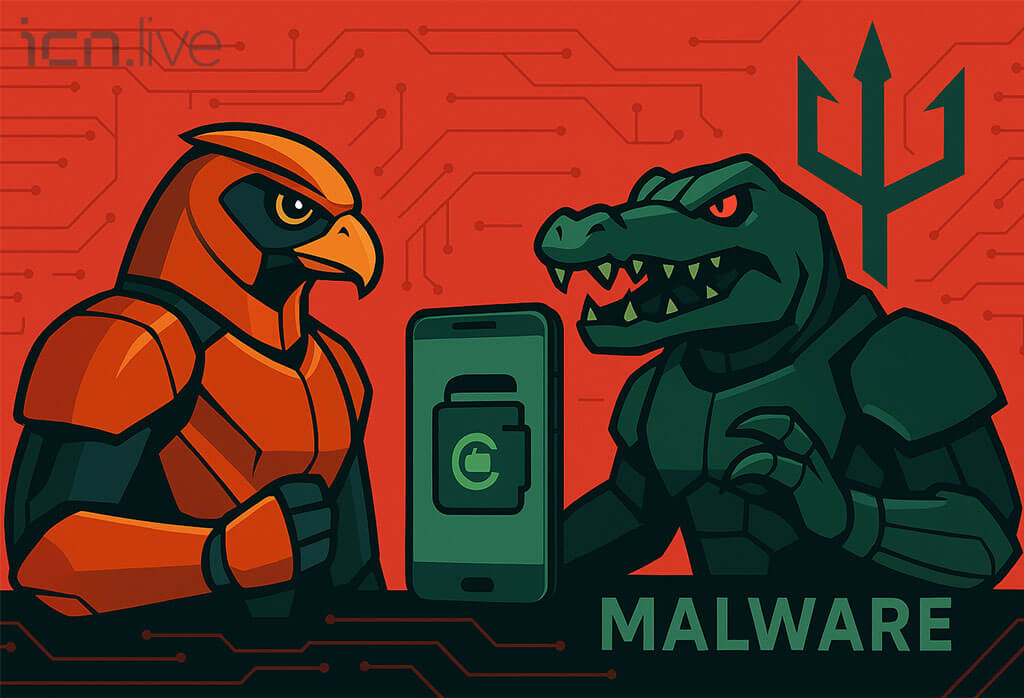Crocodilus Android malware is the latest cyber threat wreaking havoc in the crypto space.
This newly identified malware is designed specifically to infiltrate Android devices and extract sensitive data, especially from crypto wallets. Security researchers have found that Crocodilus is distributed through rogue apps and fake websites, mimicking legitimate crypto platforms.
Once installed, Crocodilus Android malware gains access to accessibility services. This gives it the power to read screen content, log keystrokes, and even control the device remotely. By bypassing standard security checks, it can harvest wallet credentials, seed phrases, and two-factor authentication tokens. This leaves users highly vulnerable to complete asset theft.
The malware reportedly communicates with a command-and-control (C2) server in real time. This allows hackers to execute commands dynamically, such as initiating unauthorized transfers or hijacking the user’s crypto account. Victims may remain unaware of the breach until their funds are gone.
Crypto wallets face a new Android-based menace
Security experts emphasize that Crocodilus Android malware is part of a broader trend. Cybercriminals are increasingly targeting mobile devices to gain access to digital assets. With mobile crypto use on the rise, the stakes are higher than ever.
The malware campaign appears to be well-funded and organized. The distribution channels include trojanized apps and phishing sites impersonating major exchanges. These deceptive tactics lure unsuspecting users into installing malware, thinking they’re getting tools to manage or trade crypto.
So far, the Crocodilus Android malware has mostly targeted users in Asia and Eastern Europe. However, given its sophisticated design, it could soon go global. Law enforcement agencies and cybersecurity firms are ramping up efforts to track and neutralize the threat.
Protect yourself from Crocodilus Android malware
To avoid becoming a victims, users must take precautions. First, never download crypto-related apps from unofficial sources. Always double-check URLs before entering credentials. Use reputable antivirus apps that can scan for malware behavior, not just known signatures.
Second, disable accessibility permissions for apps unless absolutely necessary. These permissions are powerful and rarely needed for most crypto tools. Keeping your Android OS and apps updated is also key to minimizing vulnerabilities that Crocodilus could exploit.
Finally, consider using hardware wallets for long-term storage. By keeping your private keys offline, you dramatically reduce the risk of malware like Crocodilus compromising your crypto holdings.
Crocodilus Android malware raises the alarm in the crypto world
The rise of Crocodilus Android malware is a stark reminder that crypto security must evolve constantly. Mobile devices are convenient but are also highly exposed to digital threats. As hackers develop more advanced malware, the crypto community needs to respond with smarter defenses and greater awareness.
By staying informed and vigilant, users can protect themselves and help reduce the impact of threats like Crocodilus. The crypto world is exciting, but only those who secure their assets can truly enjoy its benefits.
ANOTHER MUST-READ ON ICN.LIVE:
Nasdaq AVAX listing boosts Grayscale ETF appeal amid crypto adoption

 Bitcoin
Bitcoin  Ethereum
Ethereum  Tether
Tether  Solana
Solana  XRP
XRP  USDC
USDC  Lido Staked Ether
Lido Staked Ether  Cardano
Cardano  Avalanche
Avalanche 
